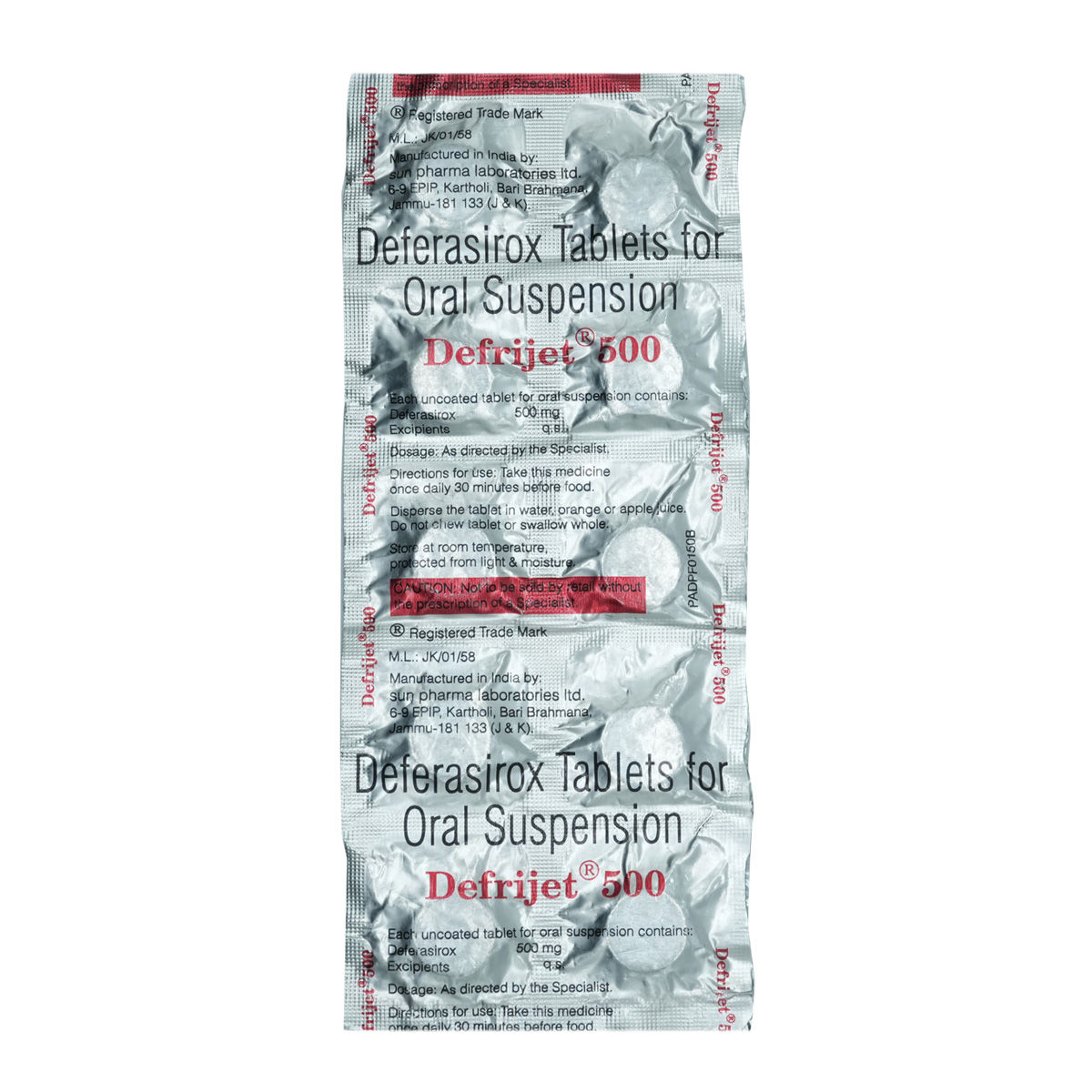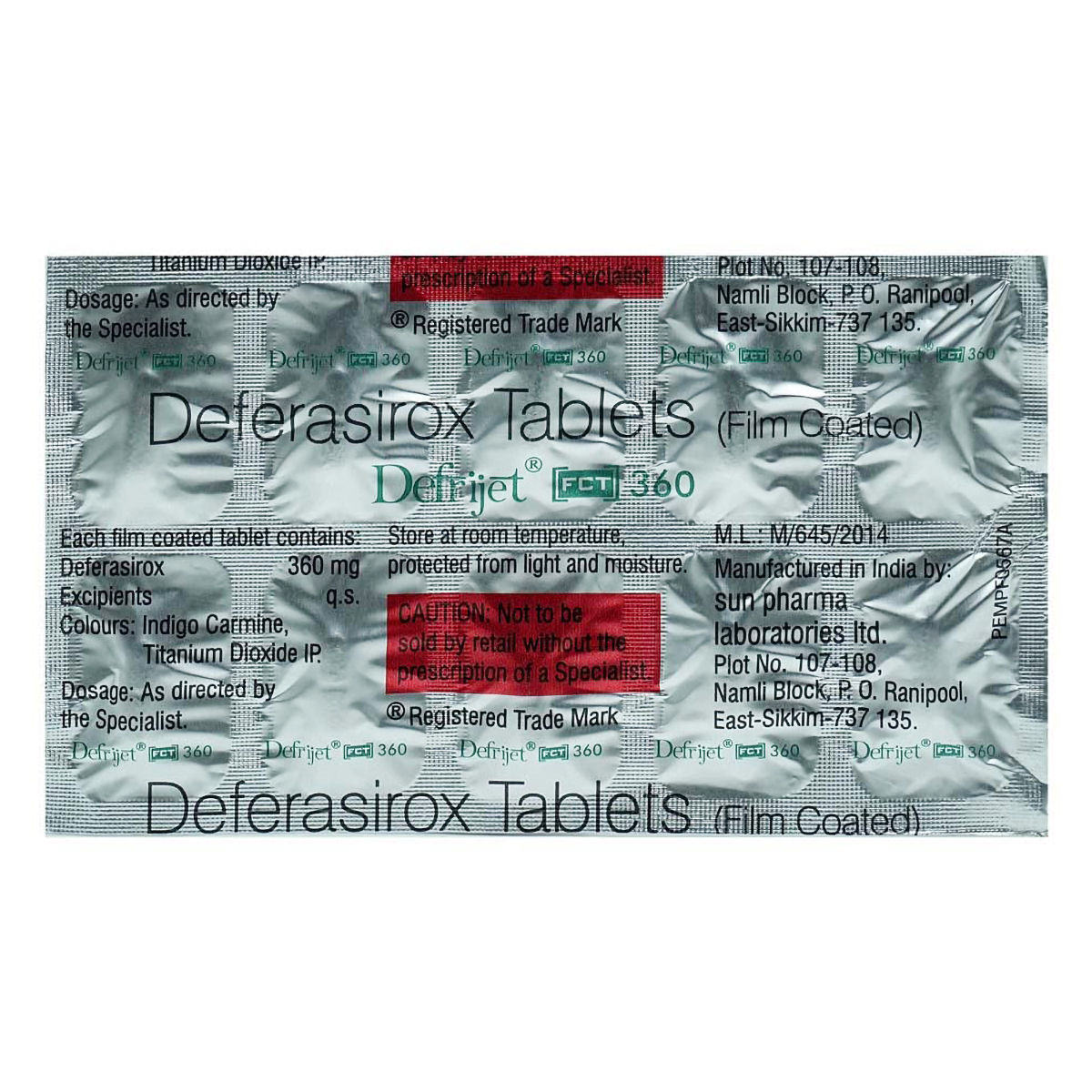Deferasirox
About Deferasirox
Deferasirox is used for treating chronic iron overload due to blood transfusions (transfusional hemosiderosis) in patients two years older. It can also be indicated for treating chronic iron overload in patients ten years of age and older with non-transfusion-dependent thalassemia (NTDT).
The active ingredient in Deferasirox is deferasirox. It is a trivalent iron selective chelating agent. It binds the excess iron and eliminates it through faeces. The danger of organ damage is reduced as a result.
Deferasirox is available in the form of oral formulations. Please take Deferasirox in the dose and duration prescribed by your doctor based on specific medical conditions. In some cases, you may experience common side effects such as diarrhoea, vomiting, nausea, abdominal pain, skin rashes, and increased serum creatinine. Most of these side effects do not require medical attention and will resolve gradually over time. However, you are advised to talk to your doctor if you experience these side effects persistently.
To treat your condition effectually, continue using Deferasirox for as long as your doctor has prescribed it. Do not use Deferasirox without a doctor's advice if you have a skin reaction or irritation to any medicine. Consult your doctor before using the Deferasirox if you are pregnant or breastfeeding. Do not use Deferasirox in more than prescribed doses or for a longer duration as it may cause adverse effects. Keep your doctor informed about your health condition and all the medicines you take before taking Deferasirox to rule out any side effects.
Uses of Deferasirox
Medicinal Benefits
Deferasirox is the active component in Deferasirox. It's a chelating agent that selectively binds to trivalent iron. It binds extra iron and excretes it in the faeces. As a result, the risk of organ damage is lowered.
Directions for Use
Storage
Side Effects of Deferasirox
Diarrhea
- Vomiting
- Nausea
- Abdominal Pain
- Skin Rashes
- Increases in Serum Creatinine
Drug Warnings
Do not take Deferasirox if you are allergic to Deferasirox or its ingredients. Deferasirox is not usually recommended if you are a pregnant or lactating woman; there is not enough information to say whether it's safe. However, your doctor may prescribe it if they think the medicine's benefits outweigh the risks. It is unknown whether Deferasirox alters the ability to drive, so do not drive or operate machinery if you experience any symptoms affecting your ability to concentrate and react. Seek medical attention if the symptoms persist longer. Avoid consuming alcohol along with Deferasirox as it could lead to unpleasant side effects. Should monitor elderly and paediatric patients closely for toxicity.
Drug Interactions
Drug-Drug interactions: Deferasirox may interact with aluminium-containing antacids (e.g. aluminium hydroxide, aluminium glycinate), anti-diabetic drugs (e.g. repaglinide), xanthines (e.g. theophylline), alkylating agents (e.g. busulfan), nonsteroidal anti-inflammatory drugs (e.g. aspirin, celecoxib) and antihypertensive drugs (e.g. diltiazem), and common painkiller (e.g. paracetamol).
Drug-Food Interactions: Avoid consuming alcohol and caffeine along with Deferasirox.
Drug-Disease Interactions: People affected with bone marrow suppression, dermatologic toxicities, hepatic impairment, renal dysfunction, auditory and ocular abnormalities, and GI complication should consult the doctor before taking Deferasirox.
Drug-Drug Interactions Checker List:
Safety Advice

Alcohol
cautionConsume alcohol along with Deferasirox is not advisable as it may cause unpleasant side effects, or you also may become more sensitive to the effects of alcohol.

Pregnancy
cautionDeferasirox is not usually recommended if you are pregnant. This is because there is not enough information to say whether it's safe. However, your doctor may prescribe it if they think the benefits of the medicine outweigh the risks. Please consult the doctor.

Breast Feeding
cautionDeferasirox is not usually recommended if you are a lactating woman. This is because there is not enough information to say whether it's safe. However, your doctor may prescribe it if they think the benefits of the medicine outweigh the risks.

Driving
cautionIt is not known whether Deferasirox alters the ability to drive, so do not drive or operate machinery if you experience any symptoms that affect your ability to concentrate and react.

Liver
cautionShould exercise caution, and it is advisable to consult a doctor before using it. Your doctor will prescribe only if the benefits outweigh the risks.

Kidney
cautionShould exercise caution, and it is advisable to consult a doctor before using it. Your doctor will prescribe only if the benefits outweigh the risks.

Children
cautionShould be used under the supervision of healthcare provider
Habit Forming
Diet & Lifestyle Advise
Choose foods high in nutrients, such as fruits, vegetables, and whole grains.
Replace fatty protein sources with lean alternatives and consume modest quantities of healthy fat sources for improved well-being.
Create a diet that includes vegetables, fruits, whole grains, legumes, omega-3-rich foods, and lean protein sources.
Instead of saturated and trans fats, choose monounsaturated and polyunsaturated fats (fish, nuts, and vegetable oils).
Select/prepare foods and beverages with fewer added sugars/caloric sweeteners.
Be mindful of salt; consume no more than 2,300 mg each day.
Limit or avoid alcohol and caffeine consumption.
Special Advise
Monitor blood counts, liver function, and renal function monthly.
Monitor serum ferritin monthly to assess the patient’s response to therapy and minimize the risk of over-chelation.
Patients Concern
Disease/Condition Glossary
Hemochromatosis, or iron overload, is a condition in which your body stores too much iron. It can cause severe damage to your body, including to your heart, liver and pancreas.
FAQs
Deferasirox is used to treat chronic iron overload due to blood transfusions (transfusional hemosiderosis).
Deferasirox is the active component in Deferasirox. It's a chelating agent that selectively binds to trivalent iron. It binds extra iron and excretes it in the faeces. As a result, the risk of organ damage is lowered.
No, it is a prescribed drug given by a physician for preventing specific medical conditions. Taking it on your own can cause unwanted side effects.
Take the missed dose as soon as possible. However, skip the missed dose and return to your regular dosing schedule if it is time for the next dose. Do not take a double dose to make up for the dose that you missed.
Deferasirox is safe if used in the dose and duration recommended by your doctor. Take it precisely as directed, and do not skip any dose. Follow your doctor's guidelines carefully and inform your doctor if any of the side effects disturb you.
The extra iron due to iron overload is stored in pancreas. This damages the pancreas and it does not produce insulin properly. Insulin is required by the body to utilise sugar/glucose efficiently. As insulin is not produced properly, it affects blood sugar levels.
Yes, iron overload is the same as haemochromatosis. Hemochromatosis, or iron overload, is a condition in which your body stores too much iron.
Yes, Deferasirox can be used in children above 2 years if prescribed by the doctor. Talk to the doctor if you have any concerns regarding this.
Deferasirox may cause side effects like diarrhoea, vomiting, nausea, abdominal pain, skin rashes, and increased serum creatinine. Most of these side effects do not require medical attention and will resolve gradually over time. However, you are advised to talk to your doctor if you experience these side effects persistently.










